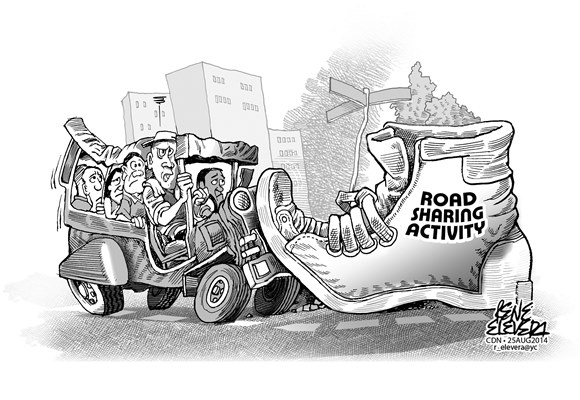Rafael Yap, Cebu City Traffic Operations Management (Citom) chief, offered simple advice to organizers of the Green Loop plan scheduled for implementation in Cebu City on the last Sunday of September.
“Sell the idea to the public first, then apply for a road permit,” Yap told the organizers comprised mostly of environmental and civil society groups last week.
One need only look at the outcome of the Sept. 24, 2011 Road Revolution activity to see the practical wisdom behind Yap’s advice.
That last road experiment, held on a Saturday, drew so much public backlash that environmental advocates like lawyer Antonio Oposa cannot afford to ignore even if they continue to blame the local government for their failure to conduct an intensified information campaign before staging the activity.
Their message of road sharing, of prioritizing pollution-free mass transportation, rings hollow to thousands of inconvenienced commuters and businessmen in downtown Cebu City who could only gnash their teeth and curse at having to lose precious hours and income to adjust to a traffic re-route scheme to accommodate a handful of bicyclists and skateboarders who had Osmeña Boulevard and other areas closed off as their private playground for at least half a day.
To their credit, they did apologize to the public for the inconvenience, though they did explain that the public was only given a one day notice and the Citom approved the road experiment three days prior to its enforcement.
The Sept. 24 experiment was held due in part to the success of the June 12 Road Revolution that was held on a holiday and a Sunday, when people are mostly in Church or relaxing at home or at the beach and thus were not expected to roam the streets and roads.
Fast forward to 2014 and the environment groups at least mobilized support from the academe to push for another road sharing experiment, though this time they wisely included the transport sector and gave a one-month advance notice of their activity.
That one-month notice, perhaps a minimum or maximum period to secure public attention for their road experiment, is an acknowledgement of the need to win mass support for an ultimately beneficial program aimed at decongesting, cleaning and giving back Cebu City’s roads and streets to its residents who can walk through it without using cars.
But one should win and persuade, not seize public support by inconveniencing, imposing and stepping on other people’s rights to get to their destination even through the mass transport system currently available to them.
While it’s admirable that the private sector is taking the lead in this initiative, ultimately it is the government that should extend every assistance it can, even take the lead in making sure that the public is convinced that this program should eventually be a part of everyday living.
Disclaimer: The comments uploaded on this site do not necessarily represent or reflect the views of management and owner of Cebudailynews. We reserve the right to exclude comments that we deem to be inconsistent with our editorial standards.

